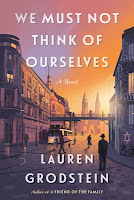Book Review: We Must Not Think of Ourselves by Lauren Grodstein

Rating: 4.5⭐️
Inspired by the stories from the real Oneg Shabbat archives, We Must Not Think of Ourselves by Lauren Grodstein takes us into the heart of the Warsaw Ghetto during WWII.
As the novel begins, we meet forty-two-year-old Adam Paskow in 1940, a widower who had been married to a Polish woman from an affluent family and was once a foreign language teacher at the Centralny Lyceum. Tricked by his former father-in-law into surrendering his home and made to move to the ghetto as Nazi occupiers began displacing Jews from their homes, Adam is forced to share a small apartment with two families- a total of ten people sharing the same space. Adam teaches English to the boys and girls in the Ghetto and works shifts at the Aid Society kitchens. He is approached by the head of a secret group of archivists, the Oneg Shabbat (Joy of the Sabbath), to join in their efforts to document life in the ghetto and the stories of the men, women and children forced out of their own homes and imprisoned in the ghetto with even less than the bare minimum resources to survive.
We follow Adam as he begins documenting life in the Ghetto. The narrative is comprised of his interviews with his students, their families and his friends – inhabitants of the Ghetto from different backgrounds who share their stories and Adam’s own story and his account of daily life – his interactions with his students whose morale he tries to boost, the struggle for sustenance, the “smuggling” of food and other necessities from outside the of gates of the Ghetto by the youngsters, the desperate measures people turn to for securing papers and a way out and much more. In 1942, when “resettlement” to the concentration camps begins with 6000 people being transported every day, Adam knows that he must do whatever he can to find a way out of the Ghetto to save himself and those close to him before it was too late.
Though this is a fictionalized account based on the Oneg Shabbat archives, a few real-life characters also make their appearance in the narrative. The tone of the narrative is matter-of-fact and occasionally dispassionate but paints a vivid picture of the horrific living conditions in the Warsaw Ghetto and the fear, anger and pain of those struggling to survive. The author also captures the resilience of the human spirit in brief moments of hope, joy, friendship and love that provide brief respite and the will to survive amid all the darkness and suffering.
Exceptionally well-written, brutally honest, factual and informative, this is a heavy read that will break your heart - a must-read for those interested in Holocaust literature. Though I have read stories set in the Warsaw Ghetto before, this is the first time I read anything about the real archivists whose written accounts have helped shed light on an important part of history. Do read the Afterword where the author briefly discusses her inspiration for this novel.
“I will admit that as I have collected testimonies for this archive, I have not always understood what the point of the archive was, or I have seen it in the mildest of terms: that the Oneg Shabbat group has been creating a collective portrait of Polish Jews at this peculiar moment in our history so that we remember what really happened, inscribing the truth of what we went through so that liberation wouldn’t erase our memories.
But now I realize that we are creating a portrait of Polish Jews at the end of our history— not one peculiar moment, but the very last moment. It is yet another surprise that it has taken me so long to understand that. When this is over, there will be no more of us. Even among the survivors, should there be any survivors, there will be no more of us.”
Many thanks to Algonquin Books and NetGalley for the digital review copy. All opinions expressed in this review are my own. We Must Not Think of Ourselves was published on November 28, 2023.
Comments
Post a Comment